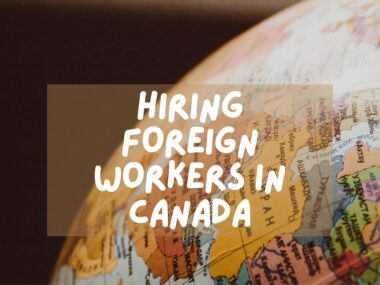New Zealand is renowned for its stunning landscapes, friendly people, and high quality of life, making it an attractive destination for foreign workers seeking new job opportunities. With a robust economy that spans various sectors, including agriculture, tourism, technology, and healthcare, New Zealand offers a wealth of employment options for immigrants. The country actively encourages skilled workers to contribute to its workforce, particularly in areas where there are labor shortages. This openness to foreign talent has created a dynamic job market that welcomes individuals from diverse backgrounds.
The New Zealand government has established various visa programs aimed at facilitating the entry of skilled workers into the country. These programs not only provide a pathway for foreigners to secure employment but also allow them to experience the unique lifestyle that New Zealand has to offer. Immigrants can benefit from a supportive environment, with access to resources aimed at helping them integrate into the workforce and society. As a result, many individuals are exploring the possibilities of building their careers in New Zealand.
However, navigating the job market and visa application process can be challenging for newcomers. This article will provide comprehensive information on job opportunities for foreigners in New Zealand, including entry-level positions, visa requirements, salary expectations, and practical steps for securing employment. By equipping potential immigrants with this knowledge, we aim to facilitate a smoother transition into the New Zealand job market.
Entry Level Jobs for Immigrants
1. Customer Service Representative
Customer service is a vital sector in New Zealand, with many businesses seeking entry-level customer service representatives to support their operations. These roles involve assisting customers with inquiries, resolving issues, and providing information about products and services. The demand for customer service representatives is particularly high in industries such as retail, hospitality, and telecommunications, making it an ideal entry point for immigrants looking to establish themselves in the workforce.
To succeed in a customer service role, candidates typically need strong communication skills, a positive attitude, and the ability to work well under pressure. While formal qualifications are not always required, having experience in customer-facing roles can be advantageous. Many employers offer on-the-job training, allowing newcomers to learn the ropes while gaining valuable experience. Additionally, customer service roles often provide flexible working hours, making them suitable for individuals who may be balancing other commitments.
The hospitality sector, in particular, is known for its welcoming attitude toward foreign workers. Many restaurants, hotels, and tourism operators actively seek individuals who can bring diverse perspectives and language skills to their teams. With a strong focus on customer satisfaction, immigrants who excel in customer service roles can quickly progress to supervisory or management positions, further enhancing their career prospects in New Zealand.
2. Agriculture and Horticulture Workers
New Zealand’s economy relies heavily on its agricultural sector, which offers numerous entry-level job opportunities for foreign workers. Roles such as farmhands, fruit pickers, and general laborers are in high demand, particularly during peak seasons. These positions provide an excellent opportunity for immigrants to gain hands-on experience while contributing to the country’s primary industries.
To work in agriculture or horticulture, candidates typically need a good level of physical fitness and a willingness to work outdoors. While formal qualifications are not always necessary, having experience in similar roles can be beneficial. Many employers provide training on-site, ensuring that newcomers are equipped with the skills needed to perform their tasks safely and efficiently. Additionally, agricultural jobs often come with the potential for seasonal work, allowing immigrants to earn income while exploring the beautiful landscapes of New Zealand.
Working in agriculture also provides an opportunity for immigrants to connect with local communities and learn about New Zealand’s culture and way of life. Many farms and orchards are family-owned, fostering a sense of camaraderie among workers. This environment can be particularly appealing for newcomers looking to build relationships and integrate into their new surroundings.
3. Construction Laborers
The construction industry in New Zealand is experiencing significant growth, driven by ongoing infrastructure projects and housing developments. Entry-level positions such as construction laborers are in high demand, making this an excellent opportunity for immigrants seeking work in the country. These roles involve assisting skilled tradespeople, performing manual labor, and ensuring that construction sites are safe and organized.
To work in construction, candidates typically need to be physically fit and able to work in various weather conditions. While some employers may prefer candidates with prior experience, many are willing to train newcomers who demonstrate a strong work ethic and a willingness to learn. Safety is a top priority in the construction industry, and workers are often required to complete safety training before starting their roles.
The construction sector also offers opportunities for career advancement. Many entry-level laborers can progress to skilled trades positions, such as carpentry, plumbing, or electrical work, with the right training and experience. This potential for upward mobility makes construction an attractive option for immigrants looking to build long-term careers in New Zealand.
4. Hospitality and Tourism Staff
New Zealand’s thriving tourism industry provides numerous entry-level job opportunities in hospitality and tourism. Roles such as hotel receptionists, tour guides, and restaurant staff are often available and can provide sponsorship opportunities for foreign workers. The hospitality sector is known for its fast-paced environment and emphasis on customer service, making it an excellent choice for individuals who enjoy working with people.
To succeed in hospitality and tourism roles, candidates typically need strong interpersonal skills, a positive attitude, and the ability to work in a team. While formal qualifications are not always necessary, experience in customer service can be advantageous. Many employers in the hospitality sector are open to sponsoring foreign workers, particularly those who demonstrate a commitment to providing exceptional service. Additionally, the seasonal nature of the tourism industry means that there are often opportunities for temporary work, allowing immigrants to gain experience while exploring New Zealand’s stunning landscapes.
Working in hospitality and tourism also provides a unique opportunity to learn about New Zealand’s diverse culture and history. Many employers value employees who can share their knowledge and experiences with visitors, enhancing the overall guest experience. This focus on cultural exchange makes hospitality an appealing option for immigrants looking to immerse themselves in New Zealand’s vibrant society.
Visa Requirements for Employment
Understanding the visa requirements for employment in New Zealand is crucial for foreign workers seeking job opportunities. The primary visa for skilled workers is the Essential Skills Work Visa, which allows employers to sponsor foreign nationals for specific roles. To qualify for this visa, applicants must meet certain criteria, which include:
- Job Offer: Applicants must have a confirmed job offer from a New Zealand employer that holds a valid sponsorship license. The job must be on the list of eligible occupations and meet the required skill level.
- Skill Level: The position must align with the skill level required for the Essential Skills Work Visa. Jobs are categorized into skill levels, and applicants must demonstrate that they possess the necessary qualifications and experience for the role.
- Salary Threshold: The position must meet the minimum salary threshold, which varies based on the skill level and location. The employer must also demonstrate that they have made efforts to recruit local talent before offering the position to a foreign worker.
- English Language Proficiency: Applicants must demonstrate proficiency in English by passing an approved English language test or having a degree taught in English.
Once the application is approved, the Essential Skills Work Visa is typically granted for a period of up to five years, depending on the duration of the job offer. After this period, individuals may be eligible to apply for residency under the Skilled Migrant Category, allowing them to settle permanently in New Zealand.
Salary Scale for Immigrants
Understanding the salary scale for various jobs in New Zealand can help immigrants set realistic expectations when applying for positions. Below is a table outlining the average annual salaries for common entry-level positions often held by foreigners in New Zealand:
| Job Title | Average Annual Salary (NZD) |
|---|---|
| Customer Service Representative | $45,000 – $55,000 |
| Agriculture and Horticulture Workers | $40,000 – $50,000 |
| Construction Laborers | $50,000 – $60,000 |
| Hospitality and Tourism Staff | $45,000 – $55,000 |
| IT Support Technician | $55,000 – $65,000 |
| Marketing Assistant | $50,000 – $60,000 |
| Sales Associate | $45,000 – $55,000 |
These figures are approximate and can vary based on factors such as location, experience, and the specific employer. Major cities like Auckland and Wellington typically offer higher salaries due to the increased cost of living, while smaller towns may provide lower wages but a more affordable lifestyle. Many employers in New Zealand also offer additional benefits, such as bonuses, health insurance, and retirement plans, which can significantly enhance the overall compensation package for employees.
Application Requirements and Documents
When applying for jobs in New Zealand, immigrants must prepare a range of documents to support their applications. The most critical documents typically include a well-structured resume or CV, a cover letter, and any relevant qualifications or certifications.
- Resume/CV: A professional resume should highlight the applicant’s work experience, education, and skills. It is essential to ensure that the document is formatted correctly and adheres to the standards of the New Zealand job market. Tailoring the resume to the specific job and employer can significantly improve the chances of being noticed.
- Cover Letter: A cover letter should accompany the resume and provide a brief overview of the applicant’s motivations for applying for the position. It is vital to tailor the cover letter to the specific job and employer, demonstrating a genuine interest in the role and how the applicant’s skills align with the company’s needs. A well-crafted cover letter can make a strong impression on hiring managers.
- Qualifications and Certifications: Applicants may need to provide copies of their qualifications, such as degrees or certifications, along with transcripts. For example, for healthcare positions, relevant certifications or training may be required. It is also advisable to prepare for interviews by researching the company and practicing common interview questions.
- Visa Documentation: Depending on the visa type, applicants may need to provide additional documentation, including proof of employment, job offer letters, and any required financial documentation to demonstrate their ability to support themselves while living in New Zealand. Ensuring that all documents are complete and accurate is crucial for a successful application process.
- References: Many employers in New Zealand may request references from previous employers or colleagues. It is beneficial to have a list of professional references prepared, along with their contact information. References should ideally be individuals who can speak to the applicant’s skills and work ethic.
Employment Websites to Find Opportunities
Several websites cater specifically to job seekers in New Zealand, providing a wealth of resources for foreigners looking for employment. Some of the most popular job search platforms include:
- Seek: One of the largest job search engines in New Zealand, Seek offers a wide range of job listings across various sectors. Users can filter their searches based on location, salary, and job type.
- Trade Me Jobs: A popular local platform, Trade Me Jobs features thousands of job listings and allows users to connect with potential employers directly.
- LinkedIn: A professional networking platform that allows users to connect with industry professionals and features job listings and company profiles. LinkedIn is widely used in New Zealand and can be an excellent tool for networking and discovering job opportunities.
- Indeed: Another global job search engine, Indeed aggregates job listings from various sources, making it easy for users to find opportunities that match their skills and preferences.
- Job.co.nz: This New Zealand-specific job board offers a wide array of job listings and allows users to create profiles to receive job alerts and recommendations based on their skills.
- Glassdoor: In addition to job listings, Glassdoor provides insights into company culture, salaries, and employee reviews, helping applicants make informed decisions about potential employers.
Utilizing these platforms can significantly enhance the job search process, allowing immigrants to discover opportunities that match their skills and preferences. Many of these websites offer tools such as job alerts, which notify users of new listings that match their criteria, making it easier to stay updated on available positions.
Step-by-Step Guide to Applying for Jobs
Securing a job in New Zealand involves several key steps. Here’s a comprehensive guide to help immigrants navigate the application process effectively:
- Research the Job Market: Start by researching the sectors that are actively hiring and the types of roles available. Understanding the demand for specific skills can help tailor your job search.
- Prepare Your Resume and Cover Letter: Create a professional resume that highlights your skills and experience. Tailor your cover letter for each job application, emphasizing why you are a good fit for the role and the company.
- Search for Job Openings: Utilize job boards, company websites, and networking platforms to find job listings. Set up job alerts on various platforms to receive notifications for new opportunities.
- Submit Your Application: Follow the application instructions carefully. Ensure that you submit all required documents, including your resume, cover letter, and any additional materials requested.
- Prepare for Interviews: If selected for an interview, research the company and practice common interview questions. Be prepared to discuss your experience and how it relates to the position. Understanding cultural nuances in interview settings can also be beneficial.
- Follow Up: After the interview, it’s a good practice to send a thank-you email to express your appreciation for the opportunity and reiterate your interest in the position. This can leave a positive impression on potential employers.
- Await Feedback: Be patient as employers may take time to review applications and conduct interviews. If you do not hear back within a reasonable timeframe, consider following up to inquire about the status of your application.
- Accepting an Offer: Once you receive a job offer, review the terms carefully, including salary, benefits, and work conditions. If everything aligns with your expectations, formally accept the offer and begin the visa application process if necessary.
- Prepare for Relocation: After accepting a job offer, start preparing for your move. This includes securing housing, understanding local customs, and familiarizing yourself with the area you’ll be living in. It may also involve setting up bank accounts, healthcare, and other necessities.
Conclusion
While many immigrants successfully find jobs in New Zealand, there are potential challenges associated with securing employment sponsorship. One of the primary hurdles is competition, as many roles attract a high number of applicants. This is particularly true for popular sectors such as healthcare and technology, where candidates may possess similar qualifications and experience.










